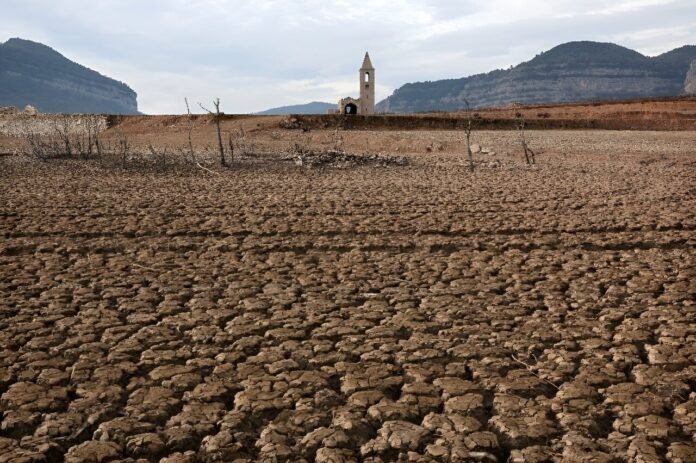The Spanish tourism industry is facing challenges as Catalonia grapples with a record drought spanning the past three years. According to Spain’s AEMET weather forecaster, Catalonia has experienced below-average rainfall, marking the driest period in northeastern Spain since weather records began. Despite recent rainfall, the situation remains dire, posing threats to the region’s economy and tourism sector.
The prolonged drought in Catalonia has raised concerns about its impact on the local tourism industry, which heavily relies on attractions such as beaches, natural landscapes, and outdoor activities. With water scarcity becoming increasingly severe, tourists may be deterred from visiting the region, impacting businesses and livelihoods that depend on tourism revenue.
Hotels, restaurants, and recreational facilities are already feeling the strain of the drought as they struggle to meet the needs of visitors amid water shortages. Reduced water availability also poses challenges for maintaining green spaces, parks, and other amenities that enhance the tourist experience in Catalonia.
Moreover, the drought has raised environmental concerns, threatening ecosystems, wildlife habitats, and agricultural activities. Water-dependent industries, such as agriculture and vineyards, are particularly vulnerable, facing diminished crop yields and increased irrigation costs.
In response to the drought, authorities in Catalonia are implementing water conservation measures and urging residents and businesses to reduce water consumption. However, the severity of the situation underscores the need for long-term solutions and sustainable water management practices to mitigate the impact on both the environment and the economy.
The tourism industry in Catalonia is closely monitoring the situation, with stakeholders advocating for proactive measures to address water scarcity and its effects on tourism. Efforts to promote alternative attractions, such as cultural heritage sites and indoor activities, may help diversify the tourism offerings and offset the impact of the drought on visitor numbers.
As the drought persists, Catalonia’s tourism industry faces mounting pressure to adapt to the changing circumstances. Tour operators and hospitality businesses are exploring innovative strategies to mitigate the impact of water scarcity on visitor experiences while promoting sustainable practices.
One approach is to diversify tourism offerings by emphasizing attractions that are less water-dependent. This includes highlighting cultural landmarks, historical sites, and gastronomic experiences that showcase Catalonia’s rich heritage and culinary traditions. By shifting the focus away from water-intensive activities, such as beach tourism and water sports, businesses can reduce their reliance on dwindling water resources.
Additionally, there is a growing emphasis on eco-tourism and nature-based experiences that prioritize conservation and environmental stewardship. Initiatives such as guided eco-tours, wildlife safaris, and nature reserves offer tourists the opportunity to explore Catalonia’s diverse ecosystems while promoting awareness of the region’s environmental challenges.
Community engagement and collaboration are also essential components of sustainable tourism management in the face of drought. Local residents, businesses, and authorities must work together to implement water-saving measures, promote responsible tourism practices, and support initiatives that enhance the resilience of tourism infrastructure.
Furthermore, investments in water infrastructure and technology can help alleviate the impact of the drought on tourism operations. This includes the adoption of water-efficient irrigation systems, rainwater harvesting techniques, and wastewater recycling initiatives to optimize water usage in hotels, resorts, and recreational facilities.
Education and awareness-raising efforts play a crucial role in fostering a culture of sustainability among tourists and industry stakeholders. Through educational campaigns, workshops, and outreach programs, visitors can learn about the importance of water conservation and responsible tourism behavior while empowering them to make informed choices during their travels.
Ultimately, the resilience of Catalonia’s tourism industry in the face of drought hinges on its ability to adapt, innovate, and embrace sustainable practices. By prioritizing water conservation, diversifying tourism offerings, and fostering collaboration among stakeholders, Catalonia can navigate the challenges posed by the record drought while ensuring the long-term viability of its tourism sector.

